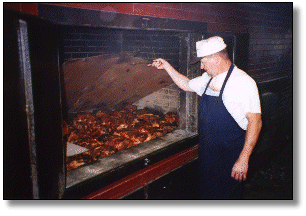"The people who
taught me about barbecue are neither academics nor professional cooks, but their knowledge
was honed in experience and shared with joy. For them barbecue means getting dirty,
drinking beer and talking while cooking great food with no trace of pretension. For,
next to survival, fellowship is the main purpose of cooking and eating. People
spending time together while preparing food and eating - this is the essence of
barbecue..."
Chris Schlesinger
Chef and Restaurateur
Now, let's talk about barbecue. Not grilling mind you,
but real, old fashion, down home barbecue. Having spent a substantial part
of my youth growing up in the south, and being surrounded by southerners,
one would think that I came to manhood understanding barbecue. Sadly this was not the case. I had ample opportunities to eat real
barbecue, and I always loved it. But my family never really prepared barbecue. Like most
folks they grilled their food, slathered on the sauce, and called it barbecue. And
don’t get me wrong, it was often very, very good. But I always wondered why, on those
occasions when we would go out for real barbecue that the meats were always so much more
tender, juicy and tasty than the grilled counterparts I got at home.
Eventually, I began to read up on the origins and techniques of real
barbecue. Now, after many failures, and sometime successes, I believe I’ve got it
figured out. Hopefully the information in here, which is minimal (I won’t bore you with history or
regional variations, or the great fights over vinegar and mustard versus tomato based
sauces, or which part of which animal makes the best barbecue), will help you get started
fixin’ the real thing. is minimal (I won’t bore you with history or
regional variations, or the great fights over vinegar and mustard versus tomato based
sauces, or which part of which animal makes the best barbecue), will help you get started
fixin’ the real thing.
First let’s define what it means to barbecue. It means that you
cook with smoke and that you cook for a long time over low heat, between 200 and 225
degrees. Smoke does flavor the meat, but that is simply a side benefit. The smoke combines
with the moisture in the cooking chamber, and coats the meat. This very important
coating process helps to seal in the natural juices of the meat ensuring, barring a gross
miscalculation, that the resulting cooked meat will not dry out. The slow cooking process
causes the connective tissue in the meat, the stuff that makes meat tough, to dissolve,
allowing you to turn the toughest of meats into melt-in-your-mouth delights.
Barbecuing was an essential part of the poor man’s culinary
repertoire for that very reason. They could spend little, often nothing at all as tough
cuts were sometimes given away, and eat like kings. Cuts of meat like a pork butt, a beef
brisket or spareribs can come out of the oven tough and gnarly, or much too fatty, unless,
of course, they are cooked very, very slowly.
|
![]() Big
Daddy's Kitchen
Big
Daddy's Kitchen